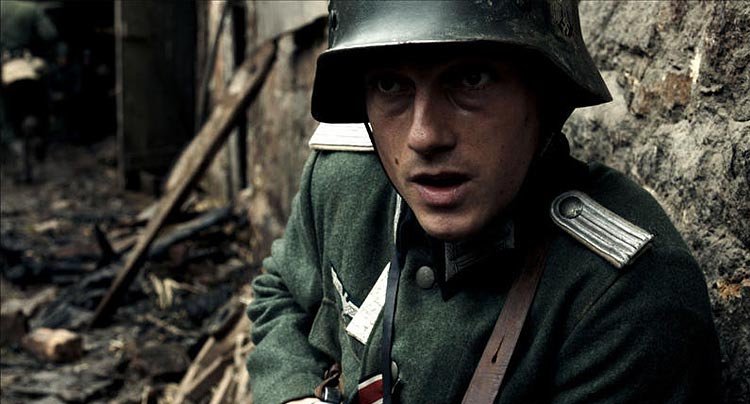
It may be a modern German epic, but it remains disappointingly shallow in terms of depth.

It may be a modern German epic, but it remains disappointingly shallow in terms of depth.
As a four-hour German epic depicting the lives of five friends before, during and after the Second World War, Generation War must be appreciated as an ambitious enterprise. Compared by critics to Band of Brothers, the film covers a tremendous amount of ground, discussing both military and civilian life during the war from German perspective.
Each of the five friends has a distinct background and personality, with each following a different life track (granting the viewer a broad spectrum of German life during the war: there is the sensitive artist turned unwilling (but ultimately battle-hardened) soldier; the ideologically-driven army nurse whose time in the field ultimately transforms her perspective on Nazism; the aspiring starlet who mingles with German officers in an attempt to jumpstart her career; the Berlin-born Jew trying to flee the country; and finally, the golden-boy Nazi officer who is becoming increasingly disillusioned with the war. Each character offers us a different perspective, and as we watch their journeys variously intersect, part, and rejoin, we begin to gain a multisided and complex vision of war-time Germany.
The film’s wartime action is well executed, it deals with the various horrors of war, and really goes into the psychological changes that each of it’s five main character’s undergoes through the course of the movie. Generation War is notable for it’s rendering of the German perspective, as so often in American cinema we simply demonize the whole of Germany during this period.

Yet there was something profoundly Disney-fied about the whole experience– despite the film’s potential to get into the details of how something like the Third Reich was possible, ultimately it shies away from such touchy questions. Modern American society has an endless fascination with Nazis. In our cultural canon they have come to symbolize everything evil and wrong in the world, up there with Osama Bin Laden and Attila. We want to know why something like Hitler and the Holocaust happened–how was it possible that a whole country went along with something so profoundly offensive to our understanding of modernity and civilization?
The characters we follow throughout the film, however, never answer these questions, nor do they really seem to be a product of the times. Except for one woman’s naive obsession with the Party (for which she is punished with rape and ultimately repents), none of them ever embrace the values of Fascism and anti-Semitism present at the time. They are correct and proper in their views, with no overt bigotry or negative characteristics that would hinder our love of them. There is no perspective on why Nazi values were important on a national or cultural level, let alone what our protagonists thought about those values. It’s as if the Third Reich was a fantastical background set for the very contemporary, progressive, clear-thinking individuals that make up the cast. The war is treated like some great fantasy– something that our sensible main characters are way to savvy to ever think of really believing in. Yet this leaves the big question unanswered: how did it happen?
The film exhibits an apologetic, ahistorical blindness to the headspace of the time that braver films and novels (The Tin Drum comes to mind) at least address. It’s as if nobody bought into all that Hitler nonsense, and that it was a few bad apples that caused such a silly mess. In this sense Generation War was extremely disappointing; it passed up on the opportunity to address significant moral questions in favor of much simpler answers, as so many other films concerning the Second World War have done. In length and breadth Generation War may be considered a modern German epic—yet it remains disappointingly shallow in terms of depth.